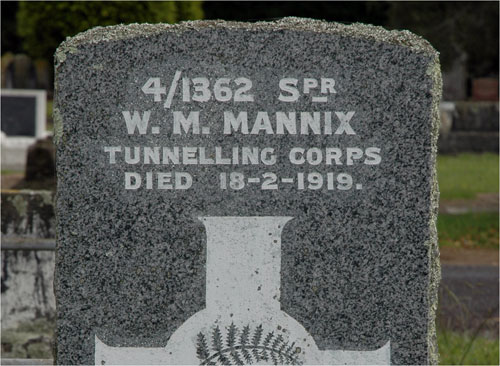
Our Men
Men who enlisted in
the New Zealand Tunnelling Company did so because of the special skills they possessed.
Generally middle aged, and older, these men were mining engineers, experienced underground gold
and coal miners, and men from Public Works Departments. They were described as 'experts in the
class of work for which they were called up'. They were not 'boys playing at war, but mature
men, hard of muscle, hand and face'.
Tunnelling Company enlistments didn't take kindly to authority. They had a job to do, and knew
how to do it. They were good at it, but not so good at saluting, especially to the British
officers.
It was reported that ‘Such
men did not take kindly to drill and were later famed throughout the Expeditionary force as
being the toughest and roughest Company’.
The Tunnelling Company also featured men from professional backgrounds. Prior to his enlistment
Captain Daniel Black Waters was Professor of Mining and Metallurgy at the University of Otago.
In 1915 he was also Vice-President of the Australasian Institute of Mining Engineers. Captain
J.D.Holmes, acting OC of the Company was the son of R W Holmes, the public works engineer who
was responsible for another remarkable engineering feat, on the North Island railway known as
the Raurimu Spiral. Captain Holmes was responsible for the construction of the Havrincourt
Bridge over the Canal du Nord, a notable engineering feat.
Far from being just manual
labourers, Tunnelling Company men were enlisting from areas such as Waihi in the Hauraki
Goldfields. They were coming from what was one of the foremost industrial sites in New Zealand.
The region was widely regarded for its technical innovations such as the introduction of
electric power, the development of tube mills, and the refinement of cyanide gold recovery
technology.
An unveiling ceremony of the War Memorial of the Institution of Mining and Metallurgy was held
in London in 1921.
Attending was Field –Marshall Earl Haig, senior commander of the World War One British
Expeditionary Force. In his address he said, ‘You have afforded me an opportunity to say
a few words of special thanks for a body of men in France that seldom drew upon itself much
notice or glory at the time, but was surpassed by none in the demands it made upon the
skill, the courage and the resolution of the individuals concerned, or in the services it
rendered to the Army as a whole.
Few outside of those who took part in the work and benefited by its results realise the
immense amount of steady, persistent toil in every circumstance of peril, surrounded by
danger in a form that might appall the stoutest hearted, that went to the preparation of
triumph. Few realise how vast, how important to the safety, comfort, and success of our
troops, was the work of the miners, work that was little commented upon in the Press, but
yet went steadily and continuously, day after day, and year after year, along the whole of
the British Front.’
Read the stories of Sapper
Michael Tobin of Tauranga who enlisted in the New Zealand Tunnelling Company and was the
first NZEF enlistment to die on the Western Front, Sergeant Sam Vernon, the first Tunneller to die as a result of enemy
action, and the Murdoch
brothers who both enlisted in the Tunnelling Company.
We are always looking for stories of New Zealand tunnellers. Contact us:
[email protected]
37498 Sapper John Alexander Bankier
contributed by grandson Keith
Garwood
Joseph Bertie
Beveridge
(aka Henry Coventry)
Sapper William Frederick (Fred) Hansen
(4.2MB PDF)
4/1571 Sapper Harry Morrison
contributed by great niece
Lynley Chapman
The
Murdoch Boys
Sapper Alexander Murdoch
Sapper William Murdoch
Sapper
Richard Henry Petterd
contributed by Shane
Petterd
Sapper
Benjamin Poole
Sapper
Michael Tobin
Sergeant Sam Vernon
Men
from Thames-Coromandel
AUSTRALIA
New South Wales
Contributed by
Hill
End & Tamboora Gathering Group
37583 Robert Douglas Lindsay Hamilton
4/1485 George Thomas White
37476 George Demetrius Zenovich
Tasmania
4/1494 Samuel Arthur Carroll
contributed by great nephew
Lance Carroll

above: Grave of Tunnelling Company enlistment in Waihi.